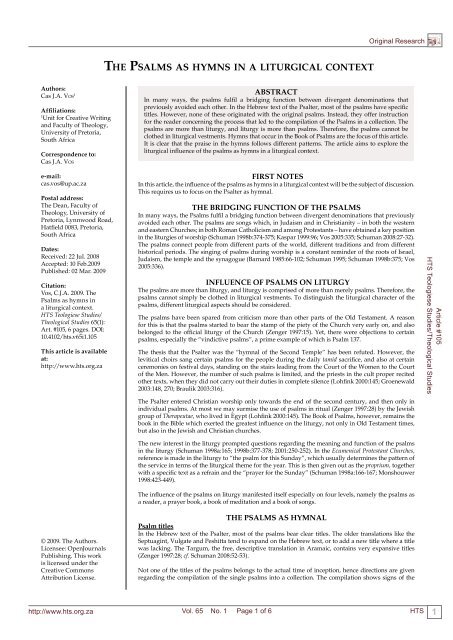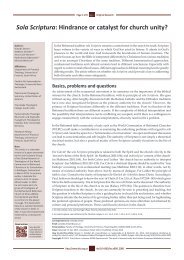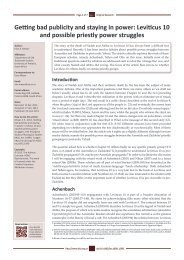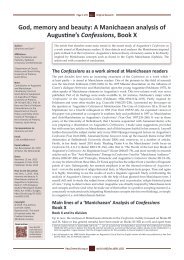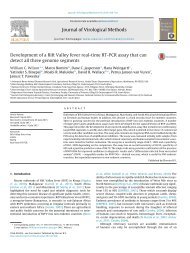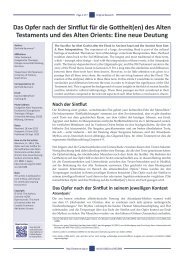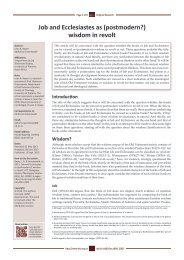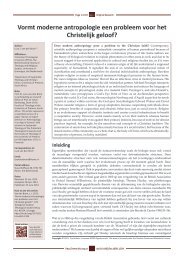THE PSALMS AS HYMNS IN A LITURGICAL CONTExT 1
THE PSALMS AS HYMNS IN A LITURGICAL CONTExT 1
THE PSALMS AS HYMNS IN A LITURGICAL CONTExT 1
You also want an ePaper? Increase the reach of your titles
YUMPU automatically turns print PDFs into web optimized ePapers that Google loves.
Original Research<br />
Th e Ps a l m s a s h y m n s in a l i t u r g i c a l c o n t e x t<br />
Authors:<br />
Cas J.A. Vo s 1<br />
Affiliations:<br />
1<br />
Unit for Creative Writing<br />
and Faculty of Theology,<br />
University of Pretoria,<br />
South Africa<br />
Correspondence to:<br />
Cas J.A. Vo s<br />
Abstract<br />
In many ways, the psalms fulfil a bridging function between divergent denominations that<br />
previously avoided each other. In the Hebrew text of the Psalter, most of the psalms have specific<br />
titles. However, none of these originated with the original psalms. Instead, they offer instruction<br />
for the reader concerning the process that led to the compilation of the Psalms in a collection. The<br />
psalms are more than liturgy, and liturgy is more than psalms. Therefore, the psalms cannot be<br />
clothed in liturgical vestments. Hymns that occur in the Book of Psalms are the focus of this article.<br />
It is clear that the praise in the hymns follows different patterns. The article aims to explore the<br />
liturgical influence of the psalms as hymns in a liturgical context.<br />
e-mail:<br />
cas.vos@up.ac.za<br />
Postal address:<br />
The Dean, Faculty of<br />
Theology, University of<br />
Pretoria, Lynnwood Road,<br />
Hatfield 0083, Pretoria,<br />
South Africa<br />
Dates:<br />
Received: 22 Jul. 2008<br />
Accepted: 10 Feb.2009<br />
Published: 02 Mar. 2009<br />
Citation:<br />
Vos, C.J.A. 2009. The<br />
Psalms as hymns in<br />
a liturgical context.<br />
HTS Teologiese Studies/<br />
Theological Studies 65(1):<br />
Art. #105, 6 pages. DOI:<br />
10.4102/hts.v65i1.105<br />
This article is available<br />
at:<br />
http://www.hts.org.za<br />
First notes<br />
In this article, the influence of the psalms as hymns in a liturgical context will be the subject of discussion.<br />
This requires us to focus on the Psalter as hymnal.<br />
The bridging function of the psalms<br />
In many ways, the Psalms fulfil a bridging function between divergent denominations that previously<br />
avoided each other. The psalms are songs which, in Judaism and in Christianity – in both the western<br />
and eastern Churches; in both Roman Catholicism and among Protestants – have obtained a key position<br />
in the liturgies of worship (Schuman 1998b:374-375; Kaspar 1999:96; Vos 2005:335; Schuman 2008:27-32).<br />
The psalms connect people from different parts of the world, different traditions and from different<br />
historical periods. The singing of psalms during worship is a constant reminder of the roots of Israel,<br />
Judaism, the temple and the synagogue (Barnard 1985:66-102; Schuman 1995; Schuman 1998b:375; Vos<br />
2005:336).<br />
Influence of psalms on liturgy<br />
The psalms are more than liturgy, and liturgy is comprised of more than merely psalms. Therefore, the<br />
psalms cannot simply be clothed in liturgical vestments. To distinguish the liturgical character of the<br />
psalms, different liturgical aspects should be considered.<br />
The psalms have been spared from criticism more than other parts of the Old Testament. A reason<br />
for this is that the psalms started to bear the stamp of the piety of the Church very early on, and also<br />
belonged to the official liturgy of the Church (Zenger 1997:15). Yet, there were objections to certain<br />
psalms, especially the “vindictive psalms”, a prime example of which is Psalm 137.<br />
The thesis that the Psalter was the “hymnal of the Second Temple” has been refuted. However, the<br />
levitical choirs sang certain psalms for the people during the daily tamid sacrifice, and also at certain<br />
ceremonies on festival days, standing on the stairs leading from the Court of the Women to the Court<br />
of the Men. However, the number of such psalms is limited, and the priests in the cult proper recited<br />
other texts, when they did not carry out their duties in complete silence (Lohfink 2000:145; Groenewald<br />
2003:148, 270; Braulik 2003:316).<br />
The Psalter entered Christian worship only towards the end of the second century, and then only in<br />
individual psalms. At most we may surmise the use of psalms in ritual (Zenger 1997:28) by the Jewish<br />
group of Therapeutae, who lived in Egypt (Lohfink 2000:145). The Book of Psalms, however, remains the<br />
book in the Bible which exerted the greatest influence on the liturgy, not only in Old Testament times,<br />
but also in the Jewish and Christian churches.<br />
Article #105<br />
HTS Teologiese Studies/Theological Studies<br />
© 2009. The Authors.<br />
Licensee: OpenJournals<br />
Publishing. This work<br />
is licensed under the<br />
Creative Commons<br />
Attribution License.<br />
The new interest in the liturgy prompted questions regarding the meaning and function of the psalms<br />
in the liturgy (Schuman 1998a:165; 1998b:377-378; 2001:250-252). In the Ecumenical Protestant Churches,<br />
reference is made in the liturgy to “the psalm for this Sunday”, which usually determines the pattern of<br />
the service in terms of the liturgical theme for the year. This is then given out as the proprium, together<br />
with a specific text as a refrain and the “prayer for the Sunday” (Schuman 1998a:166-167; Monshouwer<br />
1998:423-449).<br />
The influence of the psalms on liturgy manifested itself especially on four levels, namely the psalms as<br />
a reader, a prayer book, a book of meditation and a book of songs.<br />
The Psalms as hymnal<br />
Psalm titles<br />
In the Hebrew text of the Psalter, most of the psalms bear clear titles. The older translations like the<br />
Septuagint, Vulgate and Peshitta tend to expand on the Hebrew text, or to add a new title where a title<br />
was lacking. The Targum, the free, descriptive translation in Aramaic, contains very expansive titles<br />
(Zenger 1997:28; cf. Schuman 2008:52-53).<br />
Not one of the titles of the psalms belongs to the actual time of inception, hence directions are given<br />
regarding the compilation of the single psalms into a collection. The compilation shows signs of the<br />
http://www.hts.org.za Vol. 65 No. 1 Page 1 of 6<br />
HTS<br />
1
Original Research<br />
Vos<br />
Article #105<br />
HTS Teologiese Studies/Theological Studies<br />
association between the Old Testament and various psalms,<br />
while the spirituality is revealed of the group that prayed and<br />
meditated on these psalms (Zenger 1997:28; Leuenberger 2004;<br />
Vos 2005:44-49).<br />
Many of the titles suggest the musical form a psalm should<br />
take. Indications are also given of the melody in which a psalm<br />
should be sung. The melodies of known folk songs were used<br />
as a basis (Zenger 1997:28-29). The melody, “(D)eath of a Son”,<br />
can be linked to Psalm 9, and Psalm 57 was sung to the melody of<br />
“(D)o not Destroy!” Directions are also given for the instrumental<br />
accompaniment, e.g. “with stringed instruments” (Ps 4), “with<br />
flute” (Ps 5) and “on an eight-stringed harp, with bass voice”<br />
(Ps 6). It is supposed that the compiler did not mean these<br />
indications to be technical directions. The directions for Psalm<br />
6 indicate that the psalm was prayed/sung by those who were<br />
longing for the messianic times and, according to the rabbinical<br />
tradition, the eight-stringed harp was the instrument of these<br />
times (Zenger 1997:29).<br />
Other titles suggest either the real, or the merely fictional cultic<br />
use of a psalm. Psalm 30 is recommended “for the dedication of<br />
the temple,” Psalm 92 “for the Sabbath day” and Psalm 100 “for<br />
thanksgiving.” Such would be the directions for the real use of<br />
the psalms in the cult of the Second Temple, especially because it<br />
is more likely that the psalms originated from other situations in<br />
life (Zenger 1997:30; see also Groenewald 2003:148, 270). These<br />
headings therefore indicate a change in “Sitz im Leben”.<br />
In most cases, the titles of the psalms refer to the names of the<br />
groups or individuals to whom the psalms were connected.<br />
A psalm is linked to David 73 times, 12 times to Asaph (a<br />
prominent Levite of the post-exilic period, for whom a guild<br />
of temple musicians is named), twice to Solomon, four times<br />
to the Jeduthun, and once to Moses, Heman and Etan (Zenger<br />
1997:30; see also Jonker 2004:103-113). “The sons of Korah” and<br />
“for the sons of Korah” could be understood as meaning a psalm<br />
from the collection of the sons of Korah. However, the mention<br />
of Moses or David was intended as an editorial indication and<br />
explanation only; it was not intended as historical information.<br />
The supplicant should be able to imagine how and why this<br />
psalm (Ps 90) was prayed by Moses or David, because of the<br />
allusion in line 3 to Genesis 3:19. The supplicant should then also<br />
be able to pray the psalm with Moses or David in communal<br />
prayer (Zenger 1997:30).<br />
In Chronicles, David is neither a supplicant nor a singer of psalms.<br />
He is the founder and organiser of the temple music, probably<br />
even the inventor of instruments, as well as the commissioner<br />
for the writing of psalms and their setting to music (Braulik<br />
1995:69; Zenger 1998:41). The David of the psalms (with the<br />
exception of Psalm 30) does not stand in any liturgical context.<br />
On the contrary, his feet are firmly on the ground, as he is both<br />
a victim of persecution and a sinner. He is also someone who<br />
is threatened by enemies and is then saved from them. In the<br />
psalms, he clings to God. The psalms are not concerned with his<br />
official duty as king; instead David is depicted as a figure with<br />
which to identify: “as David, so every man” (Braulik 1995:71;<br />
Zenger 1998:41). (On David as an integration figure, see Millard<br />
1994:230-234; cf. also Kleer 1996; Leuenberger 2004:172-206;<br />
Schuman 2008:162-165.)<br />
The psalms linked to David’s name make up a collection. These<br />
psalms have “biographical” titles and, especially in the Books of<br />
Samuel, they are so intertwined with narratives that they are cast<br />
in a narrative mould (Zenger 1998:41).<br />
Psalms 50 and 73-83 are associated with Asaph. In these psalms,<br />
the accent is on divine judgement, the divine oracles and an<br />
appeal regarding God’s actions in the past. This all points to a<br />
prophetic background and reference can be made to 2 Chronicles<br />
29:30; 1 Chronicles 25:1-6 and to the sons of Korah (Ps 42-49; 84-<br />
88). These psalms originated in the Jerusalem cult and the many<br />
references to Zion are clear proof.<br />
There is no doubt that the titles of the psalms were added to<br />
the texts later, as they reflect the historical conscience of the<br />
redactors of the psalms, rather than the historical foundation.<br />
The titles also serve to bind groups of psalms together where<br />
communal theological concepts can be distinguished (Zenger<br />
1998:27). It has only been a few years since psalm scholarship<br />
acknowledged the fact that the canonical Psalter is the result of a<br />
complex process of collection as well as redaction. The attempt to<br />
explain the present shape of the Psalter is thus a relatively recent<br />
endeavour. Currently, the final form of the book of the psalms<br />
receives more attention and the idea of a somewhat haphazard<br />
arrangement has been questioned. Thus, interest in secondary<br />
settings of the psalms, including the literary context of the book<br />
as a whole, has increased. The emphasis of the reading is thus<br />
not on the individual psalm alone, but has shifted to a canonical<br />
reading of the individual psalm, i.e. on its respective position<br />
in the Psalter and, especially, the significance of its position for<br />
its interpretation (Hossfeld & Zenger 1993:166-182; Schuman<br />
2002:36-39; cf. also Groenewald 2003:277).<br />
The psalms as hymns<br />
The Book of the Psalms is the sanctuary where God is praised and<br />
from where his blessing is given. It in no way replaces the temple<br />
or the cult but instead represents an encounter with Yahweh<br />
residing in his temple on Zion as king of both Israel and the whole<br />
world (cf. Zenger 1998:47; Berges 1999:15).<br />
There are three theopoetical ways to speak to God in the psalms:<br />
via the lament, the prayer or in praise (Spieckermann 2003:137;<br />
Gerstenberger 2003:76; see Schuman 2008:48-52 on the Psalms as<br />
a book of hymns). In Hebrew translations of the psalms, praise<br />
is distinguished contextually, but not semantically (Westermann<br />
1977:20-28). We can find idioms in direct and indirect speech in<br />
the Psalms. There are also the actions of speech such as accusation,<br />
trust, self-reflection, the giving of praise to the king and to other<br />
people and so on. The three actions of speech, however, form the<br />
core of the psalms (Spieckermann 2003:137).<br />
Praise in the hymns follows different patterns (Spieckermann<br />
2003:137). There are hymns which call for praise by naming the<br />
supplicant and giving reasons for the praise (Psalms 100; 148).<br />
There are also hymns which make use of participia to describe<br />
God’s nature (Ps 104; 147).<br />
An entire anthropology is embedded in some of the hymns and is<br />
directed towards the praising of God (cf. Ps 8 and 103) (cf. Irsigler<br />
1997:1-44 on Psalm 8; cf. also Strauß 2003:17-23). Psalm 23 is a<br />
psalm of trust and is woven with a delicate hymnal thread. Even<br />
the prayer of lament ends in praise (Ps 13). The hymnal function<br />
in the psalms of lament can be clarified with two examples. In<br />
Psalm 22 – an individual psalm of lament – verses 4-6 have the<br />
function of creating an antipode to the lament. In this manner,<br />
the individual history of suffering is inserted into the history of<br />
trust and the salvation of Israel. In Psalm 74 – a people’s lament –<br />
the hymnal core, verses 12-17, creates hope after the catastrophe<br />
of 587–586 BCE by uniting with the temple theology of Jerusalem<br />
(Spieckermann 2003:138).<br />
In the fourth and fifth Book of Psalms (Psalms 90-106; 107-150),<br />
the hymnal formulas and hymnal-woven text compositions<br />
increase (Zenger 1997a; Kratz 1996; Spieckermann 2003:142).<br />
The psalm-group 90-100 is a hymnal group, which celebrates the<br />
universal kingship of God. Psalm 96 deals with the question of<br />
how nations are expected to attain salvic knowledge. In Psalm 96,<br />
it becomes clear that it is expected that Israel’s worship will have<br />
a particular effect on the nations (Psalm 96:1-4). Again, we notice<br />
the basic form of the hymn: imperative, addressee, vocative and kî<br />
(verses 1-4). However, the imperatives are liturgical only in part<br />
(three repetitions of “sing”). They are followed by verbs, which<br />
characterise the form of speech usually directed at people outside<br />
the community of worship.<br />
The poem refers to a messenger of victory, who informs people<br />
that do not know about the positive outcome of a battle, about<br />
2 HTS<br />
Vol. 65 No. 1 Page 2 of 6<br />
http://www.hts.org.za
The Psalms as hymns<br />
Original Research<br />
Yahweh. More importantly, spr (verse 3) stands for the narrative<br />
of an individual who has been saved. It also stands for the<br />
worshipping service, to which he/she invites relatives and<br />
friends. It is fitting to express gratitude towards Yahweh, even at<br />
such a casual gathering. This involves thanking him (addressing<br />
him in the second person), and the telling of the salvation to the<br />
“brothers” who need to learn this for themselves. The term “new<br />
song” belongs to the category of a song of thanksgiving (cf. Psalms<br />
40:10; 144:9ff). This song is “new,” because it tells of Yahweh’s<br />
new act of salvation.<br />
In this way, the narrative of an individual who has experienced<br />
salvation in the context of worship becomes exemplary to the<br />
nations. The Psalm is not suggesting missionary action on the part<br />
of Israel, but is concerned with the effect of Israel’s speech about<br />
Yahweh in the context of worship. The content of this speech<br />
revolves around Yahweh’s glory, which is reflected in his deeds.<br />
Once again, the purpose of the psalm is not the relaying of these<br />
deeds as mere facts, but rather, it is the imparting of theological<br />
knowledge to the nations (Jeremias 2004:96; Leuenberger 2004:150-<br />
155).<br />
Jeremias (2004:96-97; see also Millard 1994:147, 200, 207, 212, 227;<br />
Leuenberger 2004:168-172) gives a penetrating account of the<br />
appeal to the nations to participate in the religion of Israel. In<br />
Psalm 100, the plural imperative of the basic form is used to invite<br />
the nations to participate in Israel’s worship (“enter” is repeated<br />
twice in verses 2 and 4). The nations are not invited to just any<br />
form of worship, but to a festival of worship (“shout for joy” is a<br />
technical term for festival worship):<br />
Shout for joy to Yahweh, all the earth!<br />
Worship Yahweh with gladness;<br />
come before him with joyful songs.<br />
Know that the Lord is God.<br />
It is he who made us, and we are his;<br />
we are his people, the sheep of his pasture.<br />
Enter his gates with thanksgiving,<br />
and his courts with praise;<br />
give thanks to him and praise his name.<br />
For the Lord is good and his love endures forever;his<br />
faithfulness continues through all generations.<br />
(Psalm 100:1-5; New International Version)<br />
The effect of such participation is formulated in the central<br />
imperative, which is placed between the two invitations (verse 3):<br />
Acknowledge Yahweh, he is God.<br />
He made us, and we are indeed<br />
his people and the flock he shepherds.<br />
This verse is very unusual, in so far as it dares to broaden the old<br />
formula of covenant, which is the central theme of Old Testament<br />
theology. Verse 3 cites the famous formula of the covenant<br />
according to Psalm 95:7 and Psalm 79:13 and then modifies it:<br />
For he is our God,<br />
and we are the people of his pasture,<br />
a flock under his care.<br />
(Psalm 95:7)<br />
Then we, your people,<br />
the sheep of your pasture,<br />
will praise you for ever,<br />
from generation to generation we will recount your<br />
praise.<br />
(Psalm 79:13)<br />
The formula of covenant can be applied to the nations, because it<br />
is founded on the basis of a theology of creation. Psalm 95 assured<br />
Israel of its election and stressed the necessity of obedience. In<br />
contrast to election and obedience, Psalm 100 hints at creation<br />
and focuses on the knowledge of the nations, who are part of the<br />
worshipping congregation. This knowledge is based on the same<br />
assertion that is formulated in verse 3a: “Only Yahweh is God.”<br />
As in the famous confession of the nations in Isaiah 45:23, the First<br />
Commandment is broadened to refer to the nations. The First<br />
Commandment becomes the basis for the nation’s knowledge<br />
of God, which they gain within the context of worship and from<br />
their knowledge of their own existence as beings of Creation.<br />
According to Psalm 100, the most important fact in all of this is<br />
that knowledge is not a prerequisite for participation in worship –<br />
it is gained during acts of worship.<br />
It is possible that Psalm 1 was created as a precursor to Psalms<br />
90-100 and, together with Psalm 2, it forms the hinge for the<br />
hymnal conclusion in Psalms 90-100 (Spieckermann 2003:143).<br />
Psalms 1 and 2 also function as a portal to the “house” of the<br />
psalms (Schuman 2008:116-117, 130-131). The title of Psalm 90<br />
as “(a) prayer of Moses the man of God”, introduces Moses as<br />
the man who became one with the Torah. This unity fixes the<br />
Torah instruction as a way of life for Israel under the banner of<br />
a song of praise (Ps 1). This brings us to the point where praise<br />
of God as King is a universal injunction to all the earthly kings<br />
and nations (Spieckermann 2003:143). Israel already knows that<br />
because Yahweh is dwelling in Zion, the nations will learn by the<br />
destruction of their weapons: Yahweh alone is God (Ps 46:11). This<br />
knowledge is the basis for the integration of the nations into the<br />
worship of Israel by Psalm 100. When the nations are freed from<br />
their trust in weapons and their own power, they will be prepared<br />
for the truth of the worship of Israel, i.e. trusting in God alone<br />
(Jeremias 2004:98-99).<br />
The self–summons to praise God, “(p)raise the lord, O my soul,”<br />
(Ps 103:1, 22; 104:1, 35), gives an individual-universal (Psalm<br />
103) and royal, cosmic (Psalm 104) perspective on God’s praise.<br />
Psalms 104-106 are editorially linked by the jubilant invocation<br />
“(h)allelujah” (Ps 104:35; 105:45; 106:1, 48). Psalms 106 and 107 are<br />
linked by the introductory hymnal invocation, “(p)raise the Lord.<br />
Give thanks to the Lord, for he is good; his love endures for ever”<br />
(Ps 106:1; 107:1).<br />
Psalms 105-107 are compositions that revolve around the history<br />
of salvation and the nation’s catastrophes. The chorus of Psalm<br />
107 is an incentive to praise God for his mercy and miracles (vs 8,<br />
15, 21, 31, 43). The twin Psalms 111 and 112 have hymnal features.<br />
The composition of the two Psalms, as well as the twofold<br />
“(h)allelujah,” indicates that both should be read as texts of praise<br />
(Spieckermann 2003:144; Leuenberger 2004:292). The Egyptian<br />
hallel, Psalms 113-118, has an introductory “(h)allelujah” (on the<br />
Egyptian hallel, see Millard 1994:30–34; Schuman 2008:195-196,<br />
204, 138). The “(h)allelujah” also reverberates in Psalms 115:18;<br />
116:19 and 117:2. In Psalm 116, the hymn of thanksgiving and the<br />
votive offering are bound to the local sanctuary or the temple of<br />
Jerusalem, to where the sacrifice was brought (Janowski 2003:98;<br />
Leuenberger 2004:294).<br />
Psalm 117 is the shortest psalm in the Old Testament. It evidently<br />
corresponds to the basic form of hymns of praise, namely the<br />
imperative, the addressee, the vocative, the kî and the verb “great<br />
is” (gabal) in the perfect.<br />
Praise Yahweh, all you nations;<br />
extol him, all you peoples.<br />
For great is his love towards us,<br />
and Yahweh’s faithfulness endures for ever.<br />
Hallelujah.<br />
However, there are three important digressions from the usual<br />
form (Jeremias 2004:95-96; Leuenberger 2004:294):<br />
• The imperatives at the beginning are no longer liturgical in a<br />
realistic manner. The people called upon to praise Yahweh are<br />
not present; instead, Israel is representing them. It is implied<br />
that the whole world should worship Yahweh, because he<br />
is the King of the World. However, this is an eschatological<br />
perspective and, for the time being, the congregation is<br />
worshipping in a representative way.<br />
• The nations did not personally experience the God of the<br />
Article #105<br />
HTS Teologiese Studies/Theological Studies<br />
http://www.hts.org.za Vol. 65 No. 1 Page 3 of 6<br />
HTS<br />
33
Original Research<br />
Vos<br />
Article #105<br />
HTS Teologiese Studies/Theological Studies<br />
Bible. However, the experiences of Israel are enough to call<br />
upon the nations to take part in the praising of Yahweh. This<br />
Psalm raises the question of how the nations should come to<br />
their own knowledge of God.<br />
• Since the Psalm is touching on a basic problem, instead<br />
of an enumeration of deeds of Yahweh (as is the case in<br />
Ps 136), only the essential knowledge derived from his<br />
deeds is mentioned, namely his attributes of kindness and<br />
trustworthiness. The nations can participate in worship only<br />
when they possess a basic knowledge of these attributes. For<br />
the time being, Yahweh’s kindness is only being experienced<br />
by Israel and will only be experienced by the nations at a<br />
later stage.<br />
Psalm 118 is well known because it is part of the Easter liturgy<br />
(Schuman 2008:59). This Psalm starts and ends with “(g)ive thanks<br />
to the Lord, for he is good. For his love endures for ever.” This<br />
forms an inclusio. The difference is apparent, however, in that the<br />
elements of a collective hymn are almost absent, while elements<br />
which are usually part of a song of thanksgiving form the centre of<br />
the Psalm (Millard 1994:53, 80; Leuenberger 2004:295). Although<br />
Psalm 118 is a thanksgiving psalm, it nevertheless contains<br />
hymnical elements (cf. the inclusio, verses 1 and 29). Thanksgiving<br />
is an important way of praising Yahweh. The congregation which is<br />
singing this hymn is giving praise from an individual perspective.<br />
Since the songs of thanksgiving tend to include didactic elements,<br />
the congregation is instructed to learn about Yahweh through<br />
individual salvation. Hence, the connection between the praising<br />
of Yahweh and the congregation’s knowledge of Yahweh can<br />
easily be grasped (Jeremias 2004:93-94; cf. Schuman 2008:196).<br />
Give Yahweh thanks for he is good;<br />
his love endures for ever (verse 1).<br />
From my anguish I cried to Yah(weh)<br />
And he answered me<br />
by setting me free.<br />
Yahweh is with me:<br />
I will not be afraid.<br />
What can men do to me?<br />
Yahweh is with me;<br />
he is my helper.<br />
I will look in triumph on my enemies.<br />
It is better to take refuge in Yahweh<br />
than to trust in man.<br />
It is better to take refuge in Yahweh<br />
than to trust in princes.<br />
(verses 5-9)<br />
Verse 5 contains the narrative of the salvation of an individual<br />
in need. Once again, this narrative is extremely short – there is<br />
no biographical detail. Yet, it contains some of the most beautiful<br />
images in the entire Old Testament. The individual’s need is<br />
likened to a situation of confinement and salvation to a large<br />
and free space in which movement in all directions is possible<br />
(Jeremias 2004:94).<br />
The consequences are given in greater detail in verses 6-9. Also,<br />
the knowledge which the congregation can glean from this<br />
individual’s experience is described. Two pairs of verses are used<br />
– the first (vs 6) is written in the first person, the second (vs 8) in<br />
a generalised didactic style. This second pair of verses takes up a<br />
common subject in the discourse of the Old Testament, namely the<br />
difference between trusting Yahweh and trusting man’s power.<br />
With regard to the latter, influential persons are named, whereas<br />
“horses” (Is 31:3 et seq.) or “young men” in their prime (Is 40:30 et<br />
seq.) usually fulfil this role. Here, the values of life are exchanged<br />
with the hymn of festival worship.<br />
Circumstances that are seemingly evident, such as the use of<br />
power, the idealisation of youthful strength and the relationship<br />
with important people all appear as failure. Placing trust in God,<br />
though seemingly uncertain, is presented as the true foundation of<br />
life (Jeremias 2004:94).<br />
Psalm 134 concludes the collection of pilgrimage psalms (120-<br />
134) (Millard 1994:27, 40-41; cf. Schuman 2008:197), with a<br />
hymnal call: “Behold, bless the Lord …” (Ps 134:1-2). Psalm<br />
135 corresponds to Psalm 134 (cf. Ps 135:1 et seq., 19-21), while<br />
the antiphonal hymn, Psalm 136, corresponds to Psalm 135 (cf.<br />
Psalm 135:3 to 136:1). The hymnal echo “(g)ive thanks to the<br />
Lord, for he is good. His love endures for ever” (Psalm 136:1)<br />
also reverberates in Psalms 106 and 118. In Psalm 136 there are<br />
quite a number of peculiarities. Jeremias (2004:93) mentions<br />
the most important ones (cf. also Millard 1994:14, 15, 33, 39, 40,<br />
78-79, 203; Human 2004:73-88; Leuenberger 2004:280, 316-320;<br />
Schuman 2008:118, 197):<br />
• Psalm 136 is a litany; the congregation answers the different<br />
sections of the poem with a refrain.<br />
• It comprises a long list of God’s deeds, which are enumerated<br />
by the grammar of the participles. Thus, the Psalm consists of<br />
one single sentence.<br />
• The different deeds of God belong to the category of<br />
miracles (verse 4); this verse forms a kind of hermeneutic<br />
superscription.<br />
• A noticeable polemical atmosphere is present in the poem;<br />
verses 2-3 provide it in the form of a superlative, while<br />
verse 4 stresses God’s incomparability: “he alone.” The First<br />
Commandment with its differentiation of powers forms the<br />
basis of this sentence.<br />
More important than these observations is the theological<br />
knowledge out of which the refrain evolves. This refrain dares to<br />
say, “his love is everlasting.” The refrain implies that it is possible<br />
to say things about God that will remain valid forever, based on<br />
the experiences which the Psalm enumerates. The refrain implies<br />
that Israel did not experience Yahweh’s kindness only on some<br />
occasions, but always and continuously, even when the people<br />
did not notice anything (Jeremias 2004:93).<br />
This is a rather keen assertion and it is clear that it cannot be<br />
supported by a single experience of God, but only by a chain of<br />
linked experiences (which are given in the canonical order: exodus<br />
– desert – land, verses 10-22). This chain of experience even reaches<br />
into the present (vs 23-25), and it starts with the Creation (vs 6-9),<br />
which qualifies as the first-ever act of God in history (Human<br />
2004:77, 79, 80-83).<br />
Each of these experiences is in itself a “miracle,” each of these<br />
experiences bears witness to the truth of the First Commandment<br />
(vs 4). Yet, according to the hymn, only these experiences can<br />
have “everlasting” consequence. This consequence is emphasised<br />
as special, given the specific undertones of the term hsd, which<br />
denotes not only the kindness of God, but also implies an element<br />
of the unexpected, and an abundance of experiences of God<br />
(Groenewald 2003:81; Jeremias 2004:93).<br />
A series of prayers principally attributed to David (Ps 137-144),<br />
in which the lament dominates, culminate in the acrostic Psalm<br />
145. In this Psalm, praise for the Lord, who commands royal<br />
power, is declared. His kingship is for all times and encompasses<br />
all generations (Ps 145:11-13). In Psalms 146-150, hymnal sounds<br />
vibrate. These Psalms begin and end with “(p)raise the Lord.”<br />
Each hemistich in Psalm 150 breaks out in a “(h)allelujah” (Loader<br />
1991:165; Spieckermann 2003:144; Schuman 2008:141-142). Due to<br />
the precise regularity with which the exclamation “(h)allelujah”<br />
appears, the page layout or visual appearance of the printed poem<br />
emphasises the laudatory character of the song (Loader 1991:165;<br />
Leuenberger 2004:358-364). The entire Psalm 150 is a hymn.<br />
The praise has a theopoetical function, because giving praise is part<br />
of life. Praise and the lack of praise face each other as life and death<br />
(Von Rad 1966:381). For biblical Israel, life was impossible without<br />
giving praise to God. The Old Testament reiterates the following<br />
sentence: “The dead ones do not praise God.” This sentence is not<br />
primarily concerned with the dead, but with those still living. If<br />
there is no giving of praise, there is no life. If no praises are sung,<br />
the power of death penetrates life (Jeremias 2004:99). Therefore,<br />
giving praise is the meaning of life:<br />
4<br />
HTS<br />
Vol. 65 No. 1 Page 4 of 6<br />
http://www.hts.org.za
The Psalms as hymns<br />
Original Research<br />
Let me live that I may praise you,<br />
and may your laws sustain me.<br />
I will not die but live,<br />
and will proclaim<br />
what Yah(weh) has done.<br />
Giving praise becomes the most elementary<br />
characteristic of being alive. However, one has to be<br />
wary of one particular dangerous situation:<br />
Praise Yahweh, O my soul;<br />
all my inmost being,<br />
praise his holy name.<br />
Praise Yahweh, O my soul,<br />
and forget not all his benefits –<br />
who forgives all your sins<br />
and heals all your diseases,<br />
(Psalm 119:175)<br />
(Psalm 118:17)<br />
(Psalm 103:1-3)<br />
The Psalm warns that people who forget to praise God lose part<br />
of their lives. Forgetting is not merely an intellectual act – it can<br />
also involve an orientation on the part of both humans and God<br />
towards life. The best example of this can be found in Psalm<br />
25:6-7:<br />
Remember, Yahweh,<br />
your great mercy and love,<br />
for they are from of old.<br />
Remember not the sins<br />
of my youth<br />
and my rebellious ways;<br />
If God were to remember all the transgressions of the youth,<br />
nobody would survive. Instead, the congregation hopes that God<br />
will remember them with mercy. Remembering God’s deeds is so<br />
important in the hymns of the Bible that later hymns in the Old<br />
Testament combine the call for praise with the call to remember.<br />
The beginning of Psalm 105 may serve as an example.<br />
Give thanks to Yahweh,<br />
call on his name;<br />
make known among the nations<br />
what he has done.<br />
Sing to him, sing praise to him;<br />
tell of all his wonderful acts.<br />
Glory in his holy name;<br />
let the hearts of those<br />
who seek Yahweh rejoice.<br />
Look to Yahweh and his strength;<br />
seek his face always.<br />
Remember the wonders<br />
he has done,<br />
his miracles, and the judgments<br />
he pronounced,<br />
O descendants of Abraham<br />
his servant,<br />
O sons of Jacob, his chosen ones.<br />
(verses 1-6)<br />
This Psalm combines the necessity to impart to the nations<br />
knowledge of Yahweh’s deeds during worship (vs 1) with the<br />
importance of reflection (vs 2) and remembering God’s miracles<br />
(vs 5). Reflection and remembering are ideally practised in a<br />
sacred place and within the community of worship (vs 4), rather<br />
than the privacy of one’s own home. Such worship helps to<br />
prevent man from forgetting (Jeremias 2004:100).<br />
not exclude each other totally. The possibility could thus even<br />
be considered – as has already been stated – that Levitical<br />
groupings were responsible for the “levitical” compilation of the<br />
Psalter. However, the possibility exists that at a later stage of its<br />
development it eventually ended in the hands of some priestly<br />
groupings. They were then finally responsible for the canonical<br />
positioning of the Psalter: they thus accorded it with canonical<br />
status. The Psalter, as a book encompassing all experience,<br />
managed to reach the ordinary people, even though it was in the<br />
possession of priests and scribes.<br />
In the time of Jesus, although the psalms were not the official<br />
liturgical songs and prayer books of the Jewish congregation<br />
in the temple and synagogue services (Barnard 1985:146;<br />
Füglister 1988:329-352.), they were sung by a guild of vocalists,<br />
accompanied by musicians. The hallel was sung (Psalms 113-<br />
118) during Passover (also the Feast of the Tabernacles). Here,<br />
we could also refer to the song of praise in Matthew 26:30, which<br />
was sung after the Holy Communion. On the way to the temple<br />
for Pentecost or the Feast of the Tabernacles, pilgrimage songs<br />
were sung (Ps 120-134). The joy of the Torah was a further reason<br />
for jubilation (Ps 1; 19; 119), and before the Sabbath morning,<br />
Psalm 72 was sung (Barnard 1985:583; Albrecht 1987:9; Strydom<br />
1994:20-21).<br />
Psalms tuned into liturgy<br />
Neither the Old nor the New Testament presents a rigid,<br />
prescribed form into which the liturgy should be moulded (Vos<br />
& Pieterse 1997:29). During the ages, however, a living Christian<br />
tradition came into being from, among others, the primal sources<br />
of the Old and New Testament and the later traditions of the<br />
Church (Barnard 1985:66-383; Strydom 1994:9-144; Schuman<br />
1998a:26-36). These traditions have a definitive character.<br />
Certain patterns, colours and sounds are noticed. However, each<br />
generation of believers must interpret the ancient sources and<br />
traditions of the Church anew, within the demands of their time,<br />
without being unfaithful to the traditions in which a definitive<br />
liturgy exists.<br />
The liturgy is the science of Christian rites and symbols (Barnard<br />
2000:5). When the Psalter becomes part of the liturgical system,<br />
it must comply with the requirements of the liturgical ritual.<br />
The choice of psalms is determined not only by the liturgical<br />
tradition, but also by various exegetical points of view (Braulik<br />
& Lohfink 2003:236; Vos 2005:358). This means that the liturgical<br />
“colour” of every psalm must be perceptible.<br />
The liturgist must also attune his ear to the “voice” of every<br />
hymn, so as to be able to “colour” the liturgy with psalms. A<br />
certain hymn may be better applied in one particular liturgical<br />
place than in another. The hymns can also be sung before the<br />
votum. Another meaningful place to use the hymns would<br />
be after the benediction – this is the liturgical place where the<br />
congregation stands with their faith before the Living Lord.<br />
From the above it should be clear that the psalm as hymn<br />
can enrich the liturgy immensely. God’s praise can be heard<br />
anywhere.<br />
Conclusion<br />
The psalms as hymns is a treasury with which God can be<br />
praised anywhere and under any circumstances. The Christian<br />
Church has also utilised the hymns of the Psalter. Therefore,<br />
we as Christians may also live and sing the ancient songs. In<br />
the hymns, the Lord God is in the centre and, in praising him,<br />
the faithful find peace. He deserves the community of faith’s<br />
worship for he is gracious, merciful and loving.<br />
Article #105<br />
HTS Teologiese Studies/Theological Studies<br />
Contrary to Zenger’s (2000:434) opinion that the Psalter is a<br />
layman’s book of eschatological knowledge of life, Spieckermann<br />
(2003:158) regards it as a book, a scroll, that was in the hands of<br />
the priests and scribes. There it became an authoritative agent,<br />
a source of insight and an inspiration for theological practise<br />
(theopoetry) when praising God. These two viewpoints need<br />
References<br />
Albrecht, C. 1987. Einführung in die Hymnologie; 3. Auflage. Göttingen:<br />
Vandenhoeck & Ruprecht.<br />
Barnard, A.C. 1985. Die erediens; 2 de druk. Pretoria: NG Kerkboekhandel.<br />
Barnard, M. 2000. Liturgiek als wetenschap van christelijke riten en<br />
symbolen. Amsterdam: Vossiuspers AUP.<br />
http://www.hts.org.za Vol. 65 No. 1 Page 5 of 6<br />
HTS<br />
5
Original Research<br />
Vos<br />
Article #105<br />
HTS Teologiese Studies/Theological Studies<br />
Berges, U. 1999. De armen van het boek Jesaja: Een bijdrage tot de<br />
literatuur-geschiedenis van het Oude Testament. Nijmegen:<br />
Universiteit Nijmegen.<br />
Braulik, G. 1995. Christologisches Verständnis der Psalmen –<br />
schon im Alten Testament?, in Richter, K. & Kranemann, B.<br />
(Hrsg.), Christologie der Liturgie. Der Gottesdienst der Kirche –<br />
Christusbekenntnis und Sinaibund, 57-86. Freiburg: Herder.<br />
Braulik, G. 2003. Psalms and liturgy: Their reception and<br />
contextualisation. Verbum et Ecclesia 24(2):309-330.<br />
Braulik, G. & Lohfink, N. 2003. Osternacht und Altes Testament.<br />
Wien: Lang.<br />
Childs, B.S. 1971. Psalm titles and midrashic exegesis. JSSt<br />
16(2):137-150.<br />
Füglister, N. 1988. Die Verwendung und das Verständnis der<br />
Psalmen und des Psalters um die Zeitenwende, in Schreiner,<br />
J (Hrsg.), Beiträge zur Psalmenforschung: Ps 2 und 22, 319-384.<br />
Würzburg: Echter Verlag.<br />
Gerstenberger, E.S. 2003. Psalmen und Ritualpraxis, in Zenger, E<br />
(Hrsg.), Ritual and poesie, 73-90. Freiburg: Herder.<br />
Groenewald, A. 2003. Psalm 69: Its structure, redaction and<br />
composition. Münster: Lit Verlag.<br />
Hossfeld, F-L. & Zenger E. (Hrsg.) 1993. Die Psalmen: Psalmen 1-50.<br />
Würtzburg: Echter Verlag.<br />
Hossfeld, F-L. & Zenger E. (Hrsg.) 2000. Die Psalmen: Psalmen 51-<br />
100. Freiburg: Herder.<br />
Human, D.J. 2004. Psalm 136: A liturgy with reference to creation<br />
and history, in Human, D. J. & Vos, C. J. A. (eds.), Psalms<br />
and Liturgy, 73-88. London: T & T Clark.<br />
Irsigler, H. 1997. Von Adamssohn zum Immanuel. St Ottilien: E O<br />
S Verlag.<br />
Janowski, B. 2003. Dankbarkeit – Ein antropologischer<br />
Grundbegriff im Spiegel der Toda-Psalmen, in Zenger, E.<br />
(Hrsg.), Ritual und poesie. 90-136. Freiburg: Herder.<br />
Jeremias, J. 2004. Worship and theology in the Psalms, in Human,<br />
D.J. & Vos, C.J.A. (eds.), Psalms and liturgy, 89-101. London:<br />
T & T Clark.<br />
Jonker, L.C. 2004. Revisiting the Psalm headings: Second temple<br />
levitical propaganda?, in Human, D.J. & Vos, C.J. A. (eds.),<br />
Psalms and liturgy, 102-122. London: T & T Clark.<br />
Kaspar, P.P. 1999. Musica sacra: Das grosse Buch der Kirchenmusik.<br />
Graz: Styria.<br />
Kleer, M. 1996. “Der liebliche Sänger der Psalmen Israels”:<br />
Untersuchungen zu David als Dichter und Beter der Psalmen.<br />
Bodenheim: Philo.<br />
Kratz, R.G. 1996. Die Torah Davids: Psalm 1 und die doxologische<br />
Fünfteilung des Psalters. ZThk 93:1-34.<br />
Liedboek van die Kerk. 2001. Kaapstad: NG Kerk Uitgewers.<br />
Leuenberg, M. 2004. Konzeptionen des Königtums Gottes im Psalter.<br />
Zürich: Theologischer Verlag.<br />
Loader, J.A. 1991. God se hemelgewelf, in Vos, C.J.A. & Müller,<br />
J.C. (reds.), Mens en omgewing, 164-173. Halfway House:<br />
Orion.<br />
Lohfink, N. 2000. Im Schatten deiner Flügel: Grosse Bibeltexte neu<br />
erschlossen. Freiburg: Herder.<br />
Lohfink, N. 1993. “Was wird anders bei kanonischer<br />
Schriftauslegung? Beobachtungen am Beispiel von Psalm<br />
6.” Studien zur biblischen Theologie, 263-293. Stuttgart:<br />
Katholisches Bibelwerk.<br />
Millard, M. 1994. Die Komposition des Psalters: Ein formgeschichtlicher<br />
Ansatz. Tübingen: J C B Mohr.<br />
Monshouwer, D. 1998. Informatie en documentatie, in Oskamp,<br />
P. & Schuman, N. (reds.), De weg van de liturgie: Tradities,<br />
achtergronden, praktijk. 423-435. Zoetermeer: Meinema.<br />
Schuman, N.A. 1995. “En wat zij zong hoorde Ik dat psalmen waren”:<br />
Over psalmen en liturgie. Intreerede, 22 September 1995.<br />
Kampen.<br />
Schuman, N.A. 1998a. De Psalmen, in Oskamp, P. & Schuman, N.<br />
(reds.), De weg van de liturgie: Tradities, achtergronden, praktijk.<br />
165-175. Zoetermeer: Meinema.<br />
Schuman, N.A. 1998b. “… Die weet gehad heeft en geen weet<br />
gehad.” Skrif en Kerk 19(2):373-380.<br />
Schuman, N.A. 2001. Psalm 91: tekst, context, en een diversiteit aan<br />
herlezingen, in Post, P., Rouwhorst, G., Sheer, T., Steensma, R.<br />
& Tongeren, L. (reds.), Jaarboek voor liturgieonderzoek deel 17,<br />
237-256. Groningen: Instituut voor Liturgie-wetenschap.<br />
Schuman, N.A. 2002. Pastorale: Psalm 23 in Bijbel en Liturgie<br />
verwoord en uitgebeeld. Zoetermeer: Meinema.<br />
Schuman, N.A. 2008. Drama van crisis en hoop: De psalmen: gedicht,<br />
gebundeld en gebeden. Zoetermeer: Meinema:.<br />
Spieckermann, H. 2003. Hymnen im Psalter – Ihre Funktion und<br />
ihre Verfasser, in Zenger, E. (Hrsg.), Ritual und poesie, 90-136.<br />
Freiburg: Herder.<br />
Strauß, H. 2003. ….eine kleine Biblia: Exegesen von dreizehn<br />
ausgewählten Psalmen Israels. Neukirchen: Neukirchener<br />
Verlag.<br />
Strydom, W.M.L. 1994. Liturgie en lied: “Sing nuwe sange,<br />
nuutgebore.” Bloemfontein: NG Sendingpers.<br />
Van Oort, H. 1991. Augustinus’ facetten van leven en werk. Kampen:<br />
Kok.<br />
Von Rad, G. 1966. Theologie des Alten Testaments. Band I; 5.<br />
Auflage. München: Chr. Kaiser.<br />
Vos, C.J.A. 2001.’n Perspektief op die nuwe Psalmomdigting. HTS<br />
56(2&3):357-376.<br />
Vos, C.J.A. 2005. Theopoetry of the Psalms. London: T & T Clark.<br />
Vos, C.J.A. & Pieterse, H.J.C. 1997. Hoe lieflik is u woning. Pretoria:<br />
RGN Uitgewers.<br />
Westermann, C. 1977. Lob und Klage in den Psalmen. Göttingen:<br />
Vandenhoeck & Ruprecht.<br />
Zenger, E. 1997. Die Nacht wird leuchten wie der Tag:<br />
Psalmenauslegung. Freiburg: Akzente.<br />
Zenger, E. 1997a. “Daß alles Fleisch den Namen seiner Heiligung<br />
segne” (Ps 145, 21): Die Komposition Ps 145-150 als Anstoß<br />
zu einer christlich-jüdischen Psalmen-hermeneutik. BZ<br />
41:1-27.<br />
Zenger, E. 1998. Der Psalter in Judentum und Christentum (FS für<br />
Norbert Lofhink). Freiburg: Herder.<br />
Zenger, E. 1998b. Einleitung in das Alte Testament. Freiburg:<br />
Herder.<br />
6 HTS<br />
Vol. 65 No. 1 Page 6 of 6<br />
http://www.hts.org.za


